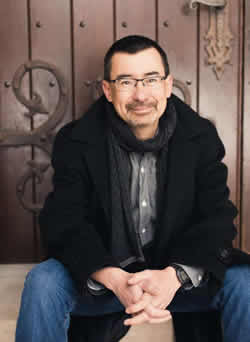Peter Ho Davies

photo credit: Dane Hillard Photography |
Peter Ho Davies is the author of two novels, The Fortunes (winner of the Anisfield-Wolf Award) and The Welsh Girl (long-listed for the Man Booker Prize), and two story collections, The Ugliest House in the World (winner of the John Llewelyn Rhys Prize) and Equal Love (A NYT Notable Book). His work has appeared in Harper's, The Atlantic, The Paris Review, Glimmer Train, The Guardian, and Washington Post among others, and has been widely anthologized, including selections for Prize Stories: The O. Henry Awards and Best American Short Stories. Davies is also a recipient of fellowships from the Guggenheim Foundation and the National Endowment for the Arts, and is a winner of the PEN/Malamud Award. Born in Britain to Welsh and Chinese parents, he now makes his home in the US and is currently on the faculty of the Helen Zell MFA Program in Creative Writing at the University of Michigan in Ann Arbor. |
Laying Fiction Over History |
 |
|
So what responsibility do you have to history as a fiction writer? Can you only write about those pockets where there's little or no record? The instinct to lay fiction over the top of history, if you like, is simply the instinct to understand why certain things happened. I've talked about Hess as a character, as a mysterious figure in the Second World War. In the same way, how Göring gets the cyanide pill in prison that he kills himself with is a minor mystery of the end of the Second World War. History, I think, to some degree, after various investigations, has to stand back out of factual responsibility and say: "We just don't know. We don't have the answers to that. We can't ascertain the truth. Maybe it'll come out in research, but we just don't know." And yet, as human beings, we want to know! So I suppose there's a desire—and I think it's a responsible desire—to understand the world, to posit possibilities and hypotheses. Given my scientific background, I think that's how we apprehend the world: we posit our hypothesis, we put it out there, we test it through the writing and we test it through the fiction, test it arguably through the publishing and the reading, to see whether it rings true to people. Whether it's the truth or not, it has the possibility to provide an explanation. One of the consolations of fiction is that it provides explanations for things we don't understand in life, in our own lives, and in the world around us. Peter Ho Davies was interviewed by Jeremiah Chamberlin who teaches at the University of Michigan. Chamberlin's fiction and nonfiction have appeared in Glimmer Train Stories, The New York Times Book Review, Poets & Writers, Flyway, The Michigan Quarterly Review, Vagabond, and elsewhere. He is the Associate Editor of Fiction Writers Review. |
|
